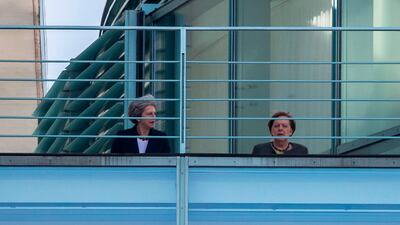Theresa May hopes to gain a final extension to the date for Brexit on Wednesday after a round of shuttle diplomacy for meetings with Angela Merkel, the German chancellor and Emmanuel Macron, the French president.
A summit in Brussels is due to consider the duration and terms that Britain can secure to avoid crashing out from the EU with the risk of transport and trade disruption.
Talks across party lines with the Labour leadership on agreeing a new approach to Brexit continued in Downing Street as senior figures tried to seal an understanding to break the deadlock.
EU leaders have demanded that Mrs May is able to provide a cogent and convincing case that an extension would result in a smooth, harmonious departure from the 46 year tie-up with Europe.
Differences also emerged over the British role in Europe if it remained a member. The French, under Mr Macron, are taking a hard line against a long extension that would allow London to play a disruptive role in issues like setting the EU budget or choosing the next leaders of the EU. An official in Paris said before the talks with Mrs May that she would have to agree to certain conditions for an extension.
“When you are a leaving member state, you are not a state member that can have a say in the important things,” the official said.
The fracturing of the common positions of the EU opens up new dangers for Mrs May, who needs 27 states to back an extension. Another group of countries, those bordering the North Sea, announced plans for a planning meeting ahead of the formal opening on Wednesday evening.
The talks with the opposition Labour Party are focused on a compromise on a customs union with the EU. A statement from Downing Street said that talks had made progress on Tuesday and would resume after the EU summit. “We have had further productive and wide-ranging talks this afternoon, and the parties have agreed to meet again on Thursday once European Council has concluded," the official said. "We remain completely committed to delivering on Brexit, with both sides working hard to agreeing a way forward, appreciating the urgency in order to avoid European elections.”
David Gauke, a pro-EU cabinet minister who serves as Justice Secretary, said he hoped to agree with Labour on the post-Brexit trading relationship with the EU should look like.
"There is common ground in terms of with our trading relationship with the European Union – we don’t want tariffs, we don’t want to have quotas, we don’t want to have rules of origin requirements," he said. "Now I think both parties agree with that so that is an area where there is common ground.”
However, a leaked letter from Liam Fox, the international trade secretary, described a Customs Union as the "worst" option facing Britain.
Conservative party jockeying for position when Mrs May steps down, as she has promised, was on display at a series of events around Westminster. One minister revealed she had a leadership campaign team up and running.
For many Europeans fatigue with Brexit has surpassed dismay as the prevailing mood.
“It’s groundhog day again,” said Michael Roth, the German Europe minister.


